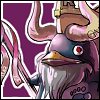Linux: Difference between revisions
No edit summary |
mNo edit summary |
||
| Line 1: | Line 1: | ||
[[Image:Linux.jpg|left|Linux-tan]] | [[Image:Linux.jpg|left|Linux-tan]] | ||
[[Image:Tux.jpg|right|Tux-kun]] | [[Image:Tux.jpg|right|Tux-kun]] | ||
Originally seen as a bearded penguin (a reference to Tux, the penguin mascot of the kernel program Linux), the more friendly image of a girl with helmet and flippers was chosen as a human alternative. Her helmet usually has horns on it, likely a reference to the GNU operating system whose components usually combine the system programs in Linux systems (hence GNU/Linux). The gear-teeth on the helmet is a reference to KDE, a common desktop environment used with GNU/Linux. Also, the foot symbol on her shirt is a reference to GNOME, another common desktop environment. She is often seen with a spear that has flags attached representing | Originally seen as a bearded penguin (a reference to Tux, the penguin mascot of the kernel program Linux), the more friendly image of a girl with helmet and flippers was chosen as a human alternative. Her helmet usually has horns on it, likely a reference to the GNU operating system whose components usually combine the system programs in Linux systems (hence GNU/Linux). The gear-teeth on the helmet is a reference to KDE, a common desktop environment used with GNU/Linux. Also, the foot symbol on her shirt is a reference to GNOME, another common desktop environment. She is often seen with a spear that has flags attached representing GRUB (GRand Unified Bootloader: a bootmanager, which is most commonly used on Linux-systems), LILO (the traditional LInux-Loader) and GCC (the GNU Compiler Collection, which includes the C-compiler with which most of the Operating System was written) -- rather important applications on every GNU/Linux-system. The helmet and spear most likely reference the high level of attention to security (defensive helmet) and hacking (offensive spear) found in Linux applications. | ||
Linux-tan is said to be either a generic Linux-distribution, or the original Linux which Linus Torvalds uploaded and which improved over the time. | |||
The following Distro-tans exist: | |||
* Arch-tan | |||
* Damnsmalllinux-tan | |||
* Debian-tan | |||
* Fedora-tan | |||
* Gentoo-tan | |||
* Knoppix-tan | |||
* Lindows-tan (she is still called Lindows-tan despite changed name of the distribution) | |||
* Mandriva-tan | |||
* RedHat-tan | |||
* Slackware-tan | |||
* SuSE-tan | |||
* Ubuntu-tan | |||
See also: | See also: | ||
Revision as of 12:30, 25 February 2007
Originally seen as a bearded penguin (a reference to Tux, the penguin mascot of the kernel program Linux), the more friendly image of a girl with helmet and flippers was chosen as a human alternative. Her helmet usually has horns on it, likely a reference to the GNU operating system whose components usually combine the system programs in Linux systems (hence GNU/Linux). The gear-teeth on the helmet is a reference to KDE, a common desktop environment used with GNU/Linux. Also, the foot symbol on her shirt is a reference to GNOME, another common desktop environment. She is often seen with a spear that has flags attached representing GRUB (GRand Unified Bootloader: a bootmanager, which is most commonly used on Linux-systems), LILO (the traditional LInux-Loader) and GCC (the GNU Compiler Collection, which includes the C-compiler with which most of the Operating System was written) -- rather important applications on every GNU/Linux-system. The helmet and spear most likely reference the high level of attention to security (defensive helmet) and hacking (offensive spear) found in Linux applications.
Linux-tan is said to be either a generic Linux-distribution, or the original Linux which Linus Torvalds uploaded and which improved over the time.
The following Distro-tans exist:
- Arch-tan
- Damnsmalllinux-tan
- Debian-tan
- Fedora-tan
- Gentoo-tan
- Knoppix-tan
- Lindows-tan (she is still called Lindows-tan despite changed name of the distribution)
- Mandriva-tan
- RedHat-tan
- Slackware-tan
- SuSE-tan
- Ubuntu-tan
See also:

